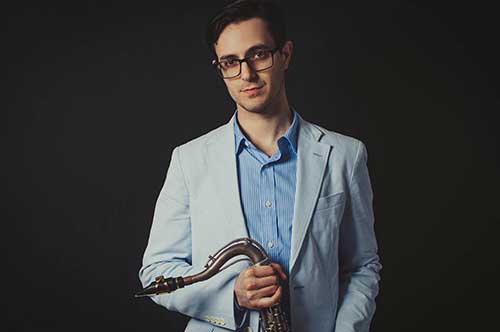Why You Too Should Be Buzzing About Sax Star, Lucas Pino
 Biography
Biography
Lucas Pino, multi-instrumentalist, composer and bandleader has been hailed as one of the most sought-after saxophone voices of his generation on the scene today. Pino has been called a “high wire act of musical textures and technique…” (Carmel DeSoto, jazzpolice.com) and been described as having “huge range, controlled ferocity, fleet notes and articulate expression” (Geoff Chapman, Toronto Star).
Pino composes for and leads the No Net Nonet, his own ensemble featuring a selection of New York City’s best young musicians. The nonet’s debut record is due out early 2015. The No Net Nonet can be seen regularly at the famous Smalls Jazz Club, where they have held a residency since 2013. A featured sideman in many groups, Lucas records and tours with acts Rafal Sarnecki, Gideon van Gelder and Jeremy Siskind among many others.”
The Interview
Zach Sollitto: Why did you choose the saxophone?
Lucas Pino: I was one of the many kids at my school that opted to try band in 5th grade. Originally, I was going to play trumpet and I remember bringing home a permission slip to my father. I had written trumpet on the permission slip and he said, “Oh, you want to play trumpet?” I replied that I actually thought the saxophone was way cooler, but didn’t want to play the same instrument as everyone else (assuming everyone had the same feelings about the saxophone and would also choose it). My father said, “If you want to play the saxophone, play the saxophone!” and that was that.
You have to understand at the time, I have two brothers and two sisters, my mother was finishing her degree at ASU – a saxophone would be a huge expense for our family. I talked with my father about looking into a school loaner horn, and went to band class the next day to get it sorted out. After school I came home to find in my bedroom a brand new student model VITO alto saxophone, and a pile of records stacked on top. I was out of my mind excited. My father took me into his office, sat me down in his chair and wrote on his dry-erase board: “My favorite saxophonists: John Coltrane, Paul Desmond, Stan Getz…” He showed me the CD’s on his shelves and told me I can listen anything, anytime I wanted. Jazz is the first music I ever really listened to, and I hope it’s the last!
ZS: Who helped you progress as a saxophonist?
LP: When I was living in Arizona, my first teacher was Romy Guzman, a student at a nearby college and I believe he’s a doctor of ethnomusicology now. My second teacher, who is still teaching and playing in Phoenix, helped introduce me to playing changes and vocabulary. His name is Tony Vacca – and I do hope you young Phoenix cats check him out. Charles Lewis is a pianist in Arizona and was my primary mentor from 15 – 18 years old. He’s in the Arizona Music Hall of Fame, and deservedly so. We used to get together every Sunday and play duo at his house. The first time I went over there I remember the first thing he said, “You’re not opposed to dissonance, are you?”
When I studied at the Brubeck Institute in Stockton, CA I had the opportunity to take lessons with a handful of amazing saxophonists/geniuses: Mike Zilber, Anton Schwartz, Andrew Speight, Benny Maupin, Vincent Herring, Miguel Zenon, Gregory Tardy – that was an amazing time. When I moved to New York, I studied with some of my favorite saxophonistx: Chris Cheek, Rich Perry, Tony Malaby and Ron Blake. It would be an understatement to say they only taught me saxophone – I don’t believe I’d still be playing music without these amazing people in my life, period.
ZS: Who do you listen to on a daily basis and why?
LP: To be honest, nothing on a daily basis. Something everyday though. I think we all get on little kicks, maybe one artist for a few months and then your brain is ready for the next thing. My favorites at the moment: Gerry Mulligan – “What Is There to Say?”, Cannonball Adderley – “Julian ‘Cannonball’ Adderley” (those arrangements!! Quincy!).
ZS: Many professional musicians recommend practicing long tones, scales, transcribing, etc, Is there material or an idea you practice which you think would help advancing students?
LP: I suppose I’m supposed to be super slick with an insightful exercise or cool practice idea, but to be honest, I’m not into practicing those types of things right now. We learn solos and scales and develop our technique so we can effectively remove the natural barrier of incompetence that impedes the art that is in us! So you got to do it! No doubt. Next step, hardest step, is you have to set those things aside and play. Play the way you speak. You want to be coherent, and understood. Record yourself, and listen back and be critical.
When I was taking lessons with Aaron Goldberg, I’d be playing in the living room, sometimes with pianist Glenn Zaleski or bassist Rick Rosato (my roommates at the time), and I’d hear coming from the kitchen things like, “your phrases are way too long!”… *playing*… “Still TOO LONG!”
We’d talk about how no one likes conversing with someone who doesn’t let you digest what they just said before moving on the the next topic – run on sentences in the form of lines! My favorite players are the ones who sound like they are actually speaking to me.
ZS: What groups are you currently playing in and do you prefer leading your own group or being a sideman?
LP: I lead my own group the No Net Nonet. We’ve been playing at Smalls for a while now. It has really been one of the great joys of my life. I love my band, the venue, the audience – it keeps growing and growing. I play in Rafal Sarnecki’s band, Gideon van Gelder’s band, Jeremy Siskind’s trio with Nancy Harms, and we do quite a bit of touring and have records recently released or very soon to be. Nick Finzer’s band, we have a CD I’m very proud of and are headed into the studio for round 2 next month. I recently joined David Lopato’s band (I think! at least we’ve been playing regularly) and that’s been a real treat – Ratzo Harris and Colin Stranahan are in that band. I play in a brazilian music group led by Richard Boukas; he calls it Quarteto Moderno and that’s with Gustavo Amarante and Mauricio Zottarelli. Brazilian music is outrageous and playing with those cats has been so rewarding.
Most recently I’ve been playing in a new trio that guitar virtuoso and all around swell guy Peter Mazza has put together. We have been playing his amazing standards arrangements and that also features bassist Tamir Schmerling. I recently made records with Eyal Vilner’s big band and Christopher Zuar’s big band, both of which feature some of my favorite musicians. Marike van Dijk has a beautiful large ensemble record coming out soon, and I’m playing mostly clarinet on that one. I couldn’t choose what I like doing more.
Some days nothing compares to having your tunes played… other days, nothing compares to helping someone else’s vision be realized.
ZS: What’s the single best piece of advice you’ve been given over the course of your playing career?
LP: Don’t play from a place of fear.
ZS: What are you trying to accomplish musically in the upcoming months?
LP: I’ve decided that I’m going to be writing a whole new book for the Nonet for our next studio recording. For those of you unfamiliar with large ensemble writing, 10 or 12 new compositions represents a significant amount of time! What have I committed myself to?! Before we do that, I believe there are plans for a live recording of the Nonet as well. We are going to release our current record early 2015. I’ve also fallen in love with the clarinet, so I’m shedding it with the goal of feeling the same type of freedom I feel when I play saxophone!
ZS: What’s your saxophone equipment setup?
LP: It’s worth noting that all my horns have been overhauled and are maintained by Mike Manning at Manning Custom Woodwinds. That’s three tenors, bass clarinet, Bb clarinet, soprano saxophone. Since meeting and working with Mike, my whole musical life has gotten better!
I play Vandoren mouthpieces, ligatures and reeds exclusively. With Vandoren it’s pretty simple. They have the best cane and the best cut. I use every reed out of the box. EVERY REED! Are you kidding? That isn’t to say that every reed is identical, but it’s damn close. The wonderful saxophonist Bryan Ruth, professor of jazz saxophone at Arizona State University, names his reeds. Fred, Herman, George etc…
You can’t be too mad at a reed when you realize they have their own personalities too! The V16 mouthpieces are the result of experts listening to artists. I used to play a vintage mouthpiece, I don’t think I’ll ever go back. The piece I play now has a super clean sound, even, full dynamic range, sub tone, straight tone and actually helps my 95 year old saxophone play a more evenly tempered scale. That’s crazy!
More about Lucas
Find his latest CD, “No Net Nonet” on Origin Records at Amazon.com.
Equipment
- Saxophone: Conn New Wonder II Tenor
- Mouthpiece: Vandoren V16 T9 large chamber metal mouthpiece
- Ligature: Vandoren Optimum Ligature
- Reeds: Vandoren ZZ 3 or 3 1/2 if I had my spinach
- Case: Manning Custom Cases
- Neckstrap: Manning Custom Strap
Find Lucas on the Web
http://www.facebook.com/LucasPinoMusic






April 22, 2016 @ 6:10 am
Richer today for having read your interview with Lucas Pino, and listening to his groove. Best, -steve